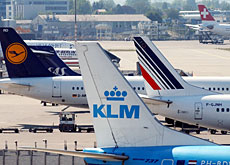
Swiss still some way from safety

Swiss International Air Lines must cut long-haul routes if it is to survive an economic downturn, a leading aviation analyst has told swissinfo.
Switzerland’s former national carrier lags behind European competitors despite recording its first-ever full-year profits and will be dropped by parent company Lufthansa if its performance sags, according to Sepp Moser.
Swiss took advantage of a market upturn to post a net profit of SFr263 million ($215.4 million) for 2006, compared with a SFr178-million loss the previous year.
But even chief executive Christoph Franz admitted that profit margins are still too narrow to weather future storms.
“Swiss achieved its turnaround and began to climb in 2006. We made further progress in improving our cost base, but this is not sufficiently competitive yet. The current positive economic environment is giving us additional lift,” he said.
Moser believes that Swiss would struggle when conditions get tougher, as expected, in the next two to three years.
“The European airline business is enjoying a boom like no other over the past ten years and it is nearly impossible not to make a profit in these conditions,” he told swissinfo.
“But to survive the difficult years ahead profits should be much higher,” Moser said, citing a minimum figure of €300 million.
“There has been no real investment in Swiss and it owns almost no assets. Swiss is on the right track compared with previous years, but it is not yet far enough to be safe.”
Lufthansa alliance
Moser believes Franz is on the right track with his cost-cutting measures, such as slashing jobs, renegotiating contracts and moving into cheaper office space.
But Swiss should drastically slim down its long-haul routes to service only the most profitable business destinations in the United States and Asia. Other European mid-sized airlines are “structurally healthier” because they only fly long haul according to their strengths, Moser added.
For example, Finland’s Finnair takes advantage of its geographical position to fly to Japan and China while Aer Lingus of Ireland flies to the US because of a large Irish immigrant population based there.
“Operating such a number of intercontinental flights is a matter of prestige and there are two driving forces behind that,” said Moser.
“The first is that the banks want their clients to have direct access from Zurich to everywhere in the world, and the second is the powerful pilots’ union, Aeropers, prefers long haul because it is less work and more pay.”
Presenting Swiss’s annual results on Thursday, Franz admitted that the takeover by German airline Lufthansa in 2005 was part of the reason behind the good results. The alliance allows both airlines to buy fuel together and coordinate schedules and check-in at airports.
However, Moser does not think Lufthansa would be in the mood to bail Swiss out financially.
“[Lufthansa] will certainly not save Swiss if [Swiss] gets into trouble because [Lufthansa] are very tough and shrewd business people. If Swiss is good for them they will keep it, otherwise they will drop it.”
swissinfo, Matthew Allen
Swiss International Air Lines was born in 2002 from the remains of bankrupt Swissair and the regional carrier Crossair.
The struggling Swiss was in turn taken over by Germany’s Lufthansa in 2005.
Lufthansa initially bought an 11% stake in Swiss in May 2005 and increased this share to 49% in July 2006 once regulatory approval had been granted.
The German airline has set a number of conditions for the completion of the takeover. These include the successful negotiation of air traffic rights around the world and that Swiss shows a profit at the end of 2007.
The only barriers to a 100% takeover at the end of this year are ongoing negotiations for traffic rights in India, Hong Kong, Russia and Saudi Arabia.
Swiss 2006 results:
Income: SFr4.153 billion.
Ebit: SFr231 million.
Consolidated profit: SFr263 million.
Cash and cash equivalents on December 31, 2006: SFr922 million (+65.2%).
Seat load factor Europe: 71.3%.
Seat load factor intercontinental: 83.8%
Personnel: 5,532 (-13.3%).

In compliance with the JTI standards
More: SWI swissinfo.ch certified by the Journalism Trust Initiative




























You can find an overview of ongoing debates with our journalists here . Please join us!
If you want to start a conversation about a topic raised in this article or want to report factual errors, email us at english@swissinfo.ch.